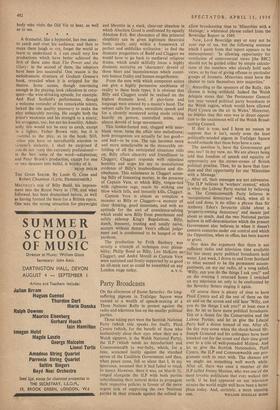THE GOOD SAILOR. By Louis 0. Coxe and Robert Chapman.
(Lyric, Hammersmith.) MELVILLE'S tale of Billy Budd, his impress- ment into the Royal Navy in 1798, and what followed, has been dramatised before, as well as having formed the basis for a Britten opera. One sees the strong attraction for- playwright
and librettist in a stark, clear-cut situation in which Absolute Good is confronted by equally Absolute Evil. But characters of this primeval simplicity can be given legitimate theatrical form, surely, only within a framework of perfect and unlifelike stylisation : to find the dramatic progenitors of Budd and Claggart we would have to go back to medimval religious drama, which could skilfully focus a highly dramatic narrative on 'characters' devoid of those blurs and inconsistencies which consti- tute human frailty and human magnificence.
From the ease with which competent actors can give a highly persuasive semblance of reality to these basic types, it is obvious that Billy and Claggart could be realised on the highest dramatic level, if plot-form and language were created by a master's hand. The subject calls for poetic, unrealistic speech and for a cleverly mannered acting mode relying heavily on gesture, controlled mime, and almost devoid of large movements.
This leaden-footed text, clogged with near- blank verse, turns the affair into melodrama; both protagonists are actually far too good— and bad—to be true. The tale becomes more and more unbelievable as the inexorable un- folding of all the anticipated situations rolls on. Billy offers sincerity and friendliness to Claggart; Claggart responds with relentless hostility and urges his spy to manufacture evidence of Billy's insubordination and dis- obedience. This culminates in Claggart accus- ing Billy of fomenting mutiny, in the presence of Captain Vere, at which Billy, tongue-tied with righteous rage, reacts by striking one blow which fells, and instantly kills, Claggart.
Captain Vere is almost as complete a monster as Billy or Claggart—a monster of clear thinking, good intentions, and with no aptitude for the sort of conscience-salving which could save Billy from punishment and safely sidestep King's Regulations. Billy, dumb, innocent, trusting and totally naive, accepts without demur Vere's official judge- ment and is condemned to be hanged at the yardarm.
The production by Frith Banbury was strictly a triumph of technique over plausi- bility; Philip Bond as Billy, Leo McKern as Claggart, and Andri Morell as Captain Vere were sustained and firmly supported by as good an all-male cast as could be assembled on any










































 Previous page
Previous page